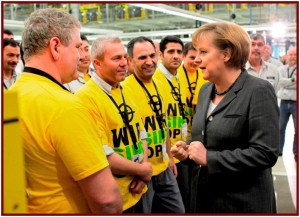After losing $20 billion since 1999 on European Operations, GM is selling its Opel/Vauxhall brands and factories to the French PSA Group. The sale almost certainly will be confirmed on Monday 6 February. Thus, ends GM’s European operations, which date back almost 100 years.
If the deal goes through, it would mean GM’s presence in Europe would be limited to niche sales of Cadillac, Chevrolet Camaro and Corvette models – all exports. PSA is the third largest automaker in Europe behind Renault. Volkswagen Group leads in Europe. PSA Group’s European sales were 1,930,000 vehicles and increased by 3.6% in 2016. In 2016, global sales increased by 5.8%, to 3,146,000 units.
It is a major shakeup of the entire European market, as the effects – likely negative – of Brexit are unknown. Opel was the lead at GM engineering for both small and mid-size cars. (Brexit Automaker Winners, Losers – Predictable and Surprising or ‘Bloody Hell,’ What Does Brexit do to Automakers?) The combined volume of the groups could exceed current second-placed Renault-Nissan, excluding Russia and the CIS* countries, making the regional European total more than 3 million vehicles (full-year 2016). Market leader Volkswagen Group is just over 4 million. GM now appears ready to cut losses in the region. This also puts the pressure on Ford Motor with its money bleeding European operations. (General Motors Posts Record 2016 Results , Ford Motor Says 2017 Profit Will be Lower Than 2016, US Auto Sales at 17.5 Million Set New Record in 2016)
PSA – Large French Presence
During 2016, the PSA Group was the first automaker and the second contributor, by overall business segments, in terms of contribution to the trade balance of France, by generating a surplus of €4.816 billion. Industry wide, the PSA Group is the first automobile manufacturer with more than one million vehicles and 80% of its engines and gear boxes manufactured in French territory in 2016. French production of the PSA Group increased by 1.3% compared to 2015, representing more than one-third of its world production. The five vehicle production plants and the eleven component manufacturing plants employ nearly 70% of the Company’s workforce worldwide.
“One of the critical operational objectives of a combined PSA-Opel entity would be the consolidation of future models onto common platforms where this is possible,” says consultancy LMC. “This would follow a review of the model ranges of both companies, with emphasis placed on those models not already too far down the development path at the point of completion.”
Opel PSA Consolidation Picks?
- New Insignia –2017. This is unlikely immediately, but future is aligned with PSA 508, so could follow.
- Mokka X – 2019. Overlap with Crossland Xso, could be re-positioned or cancelled.
- Opel D-CUV – 2019. Considered to be the Antara replacement, this could use 508 architecture, or be cancelled.
- Adam – 2019. Similar position to 108/C1 (also Toyota Aygo), so could consolidate to same platform, but this is complicated by an existing sharing relationship with Toyota and unique market positioning of the vehicle.
- Corsa – 2019. Already face-lifted and showing signs of age. Could be based on the future 208/C3 platform (EMP1), but may require delays to implement.
- Astra – 2021. Could be derivative of the next Peugeot 3008 platform (next EMP2).
- Vivaro – 2025. Recently renewed large van, could be aligned with Expert/Jumpy in relatively distant future.
Plants at Risk?
GM’s Ellesmere Port plant, already at risk because of Brexit when the current Astra comes up for replacement in 2021, looks susceptible. The next Astra could be produced elsewhere. The two large-car plants (serving the D segment) in Rüsselsheim and Rennes also could be one too many. With Rüsselsheim the location of Opel’s HQ and its historical home, the PSA Rennes plant may be the more helpless of the two. PSA’s Villaverde plant, a single-model plant, could also be under threat.
Opel/Vauxhall History
Opel was founded by Adam Opel in Rüsselsheim, Germany in 1862. Opel headquarters remain located in the brand’s hometown of Rüsselsheim. The automaker has ten manufacturing plants and operates three development and test centers in seven European countries; it has over 38,000 employees with more than 19,000 of those in Germany. Opel and its British sister brand Vauxhall are present in more than 50 countries around the globe.
Opel started manufacturing bicycles in 1886 and produced its first automobile in 1899. Opel became a share-limited company (Aktiengesellschaft) in 1929. General Motors took a majority stake in Opel then and took full control in 1931. Opel head office remain in Rüsselsheim. The automaker has ten manufacturing plants and operates three development and test centers in seven European countries. Meeting: IG Metall, Opel Works Council, PSA Group on GM Selling Opel/Vauxhall
Vauxhall was founded by Alexander Wilson in 1857 as a pump and marine engine manufacturer. It was bought in 1863 by Andrew Betts Brown who began producing traveling cranes. It was he who named it Vauxhall Iron Works. It began manufacturing cars in 1903, and was bought by GM in 1925.
* Ten former Soviet Republics: Armenia, Belarus, Kazakhstan, Kyrgyzstan, Moldova, Russia, Tajikistan, Turkmenistan, Ukraine, and Uzbekistan.


